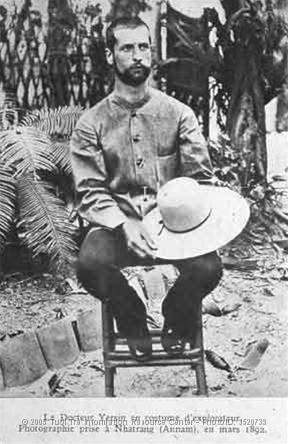A documentary about Swiss-French physician and bacteriologist Alexandre Yersin will be screened in Hanoi and Ho Chi Minh City on Thursday and Friday as part of the activities to mark the 120th anniversary of his discovery of the bacteria causing bubonic plague.
The 90-minute documentary, “Ce n’est pas une vie que de ne pas bouger” (It’s not life that one does not move) by director Stéphane Kleeb, is set to be screened for the first time in the world at Nguyen Van Dao Hall of the Vietnam National University-Hanoi at 144 Xuan Thuy, Cau Giay District, Hanoi on Thursday evening.
The film screening will be attended by Mauro Dell’Ambrogio, Swiss State Secretary of Education and Research, Vietnamese and Swiss scientists and local students majoring in natural sciences.
Prior to the screening, Professors Nguyen Tran Hien, Le Gia Vinh, Dau Ngoc Hao, and Nguyen Lan Dung, the country’s leading experts in bacteriology, general medicine, veterinary medicine and botany, four areas Dr. Yersin was dedicated to, will address major appeals and challenges in their areas.
The second film screening is to take place the next day at Hall 1, the Ho Chi Minh City University of Science at 227 Nguyen Van Cu, District 5.
Born in 1863 in Switzerland, Yersin was an eminent Swiss-French physician and bacteriologist. He is most remembered as the co-discoverer of the bacillus responsible for the bubonic plague or pest, one of the humankind’s gravest epidemics, in Hong Kong in 1894. The doctor was also credited in Vietnam with discovering Liang Biang Plateau, the site for Da Lat City, some 300 km northwest of HCMC, in 1893.
He also founded the Nha Trang Pasteur institute in 1895 and participated actively in the establishment of the Medical School of Hanoi in 1902, and was its first director until 1904.
Yersin lived and worked for 50 years (1890-1943) in Nha Trang City in central Khanh Hoa Province, died during World War II at his home in Nha Trang in 1943, and was buried in Suoi Dau in the same province.
He insisted on his deathbed that the province, not elsewhere, would be his final resting place.
His tomb has been recognized as a national relic and streets in HCMC and elsewhere also bear his name.
In September 2013, his 150th birthday anniversary, the doctor was posthumously conferred the Honorary Citizen title by the Vietnamese government.
Like us on Facebook or follow us on Twitter to get the latest news about Vietnam!




















































